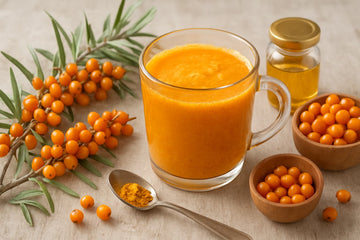The benefits of Sea Buckthorn have become popular in the mainstream. Loaded with vitamins, antioxidants, and fatty acids, the tiny orange berry is no longer a secret to health enthusiasts. And when you know how to use it right, it can deliver serious nutritional firepower.
If you're looking for a practical sea buckthorn recipe that supports immunity and brings real benefits, you're in the right place. From teas to syrups and smoothies, we'll explore tasty ways to enjoy sea buckthorn without complicating your kitchen time.
Top Sea Buckthorn Recipes
- Sea Buckthorn Immunity Juice
- Sea Buckthorn Syrup
- Sea Buckthorn Trail Mix
- Tropical Sea Buckthorn Smoothie
- Sea Buckthorn Tea
- Sea Buckthorn Oil in Dressings and Dips (usage ideas)
Sea Buckthorn Nutritional Value per 100g
|
Nutrient |
Amount per 100 g |
|
Energy |
1899 kJ / 452 kcal |
|
Dietary Fiber |
18.1 g |
|
Fat |
16.65 g |
|
• Saturated Fatty Acids |
3.2 g |
|
• Omega-3 |
2.88 g |
|
• Omega-6 |
3.99 g |
|
• Omega-9 |
3.93 g |
|
Protein |
20.52 g |
|
Vitamin C |
120 mg |
|
Vitamin A |
296 µg (37% DV*) |
|
Vitamin D |
14.5 µg (290% DV*) |
|
Vitamin E |
9.5 mg (95% DV*) |
Simple Sea Buckthorn Recipe for Immunity
Let’s start with a go-to sea buckthorn juice recipe—easy to prepare and hard to forget.
Ingredients: 1 cup fresh or frozen sea buckthorn berries, 2 cups water, 1 tbsp raw honey (optional), and half a lemon juice.
Preparation
- Rinse berries thoroughly.
- Simmer them with water for about 10 minutes.
- Once soft, mash the berries, then strain using a fine sieve.
- Add lemon juice and stir in honey if desired.
Serve slightly warm or chilled. The tangy drink delivers a serious hit of vitamin C during seasonal transitions or low-energy days.
Sea Buckthorn Syrup
A well-made sea buckthorn syrup doubles up as a topping, a mix-in for warm teas, or even a spoonful-on-its-own immune booster.
Ingredients: 2 cups sea buckthorn berries, 1 cup water, 1/2 cup jaggery or raw cane sugar.
Preparation
- Heat the berries and water until the berries burst.
- Strain through muslin or a fine mesh.
- Return the juice to the pot, add sweetener, and simmer until thick.
- Bottle and refrigerate.
Use one tablespoon daily. It keeps well for up to a month if stored properly.
Dried Sea Buckthorn Recipes: The Quick Trail Mix Twist
If you’ve got dried sea buckthorn, you’ve got options. Their tart pop adds both flavour and function to everyday snacks.
Sea Buckthorn Trail Mix
Mix equal parts of dried sea buckthorn berries, roasted almonds, pumpkin seeds, coconut flakes, and a dash of sea salt.
Keep a small jar of this mix on your desk or in your bag. The berries add tang, fibre, and antioxidants—no cooking required.
Sea Buckthorn Smoothie Recipes
A smoothie is one of the most popular ways to use nutrient-rich berries without adjusting your meals too much.
Tropical Sea Buckthorn Smoothie
Ingredients: 1/2 cup sea buckthorn berries, one banana, 1/2 cup pineapple chunks, 1/2 cup coconut water or almond milk, 1 tsp flax seeds.
Preparation
- Add all ingredients to a blender.
- Blend until smooth and creamy.
- The smoothie offers immunity support, digestive fibre, and sustained energy.
Sea Buckthorn Tea Recipe (Mild and Soothing)
Great for winding down or warming up on a rainy afternoon, this sea buckthorn tea recipe blends gentle flavor with herbal support.
Ingredients: 1 tbsp sea buckthorn berries (fresh or dried), 1 cup hot water, Slice of fresh ginger, a Cinnamon stick (optional).

Preparation
- Boil water and pour over the berries, ginger, and cinnamon.
- Let steep for 10–12 minutes.
- Strain and sip slowly.
The warmth of this infusion is great during flu season or as a daily ritual when the immune system feels depleted.
Related - Find the Pure Seabuckthorn Leaves for making Sea Buckthorn herbal tea
Cooking with Sea Buckthorn Oil
Known for its bright orange colour and earthy aroma, sea buckthorn oil is rich in omega-7 and can be used in small doses.
Ways to Use
- Add 1–2 drops to salad dressings.
- Blend into hummus or dips.
- Mix into yoghurt or overnight oats.
Sea buckthorn oil recipes don’t call for heat—avoid cooking it directly to preserve the fatty acids and antioxidants.
Why Sea Buckthorn Works So Well for Immunity
Sea buckthorn supports immune function on multiple fronts:
- High Vitamin C: Strengthens the defence against pathogens.
- Antioxidants: Protect cells from oxidative stress.
- Anti-inflammatory compounds: Soothe internal inflammation.
- Essential fatty acids: Maintain healthy mucous membranes—your first barrier against illness.
Unlike synthetic supplements, sea buckthorn provides these in a natural, food-based matrix that your body can recognise and absorb more efficiently.
Storage & Sourcing
- Fresh berries: Freeze if not using within a few days.
- Dried berries: Store in airtight jars in a cool place.
- Oil: Keep refrigerated and shielded from light.
- Syrup: Use sterilised bottles; refrigerate after opening.
When buying, look for organically grown berries or cold-pressed oil to ensure purity and potency.
Final Thoughts
Consistency matters more than one-time intake. Add sea buckthorn to your diet in a form that fits naturally: juice in the morning, syrup at night, or a handful of dried berries in your snack bowl.
The variety of sea buckthorn recipes available today means it’s easier than ever to support your health goals without reinventing your meals.
Start small. Listen to how your body responds. You might just find yourself reaching for that bright orange boost more often than expected.
Also check - Simple Saffron Recipes to Try at Home









